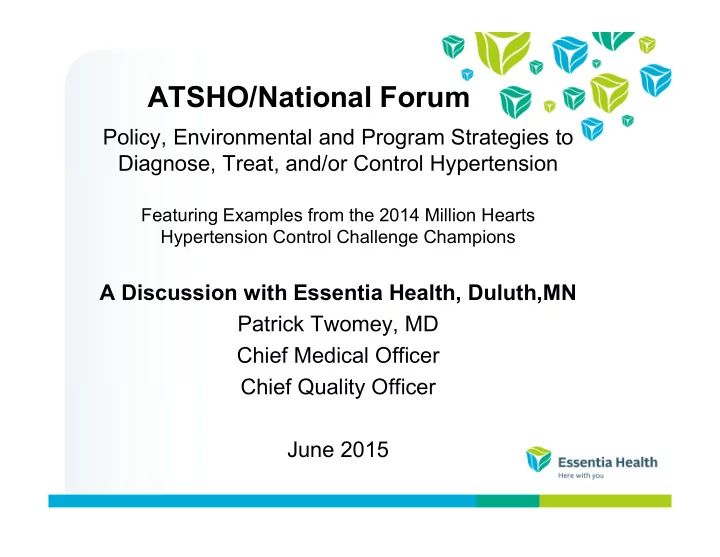

ATSHO/National Forum Policy, Environmental and Program Strategies to Diagnose, Treat, and/or Control Hypertension Featuring Examples from the 2014 Million Hearts Hypertension Control Challenge Champions A Discussion with Essentia Health, Duluth,MN Patrick Twomey, MD Chief Medical Officer Chief Quality Officer June 2015
For discussion • What is the current reality of hypertension diagnosis, treatment and control in your client population? • What were the main planning and implementation actions that you took in your clinic to improve hypertension diagnosis, management and control ? • What were the key successes and challenges for your clinic in achieving hypertension control rates at 70% or more? • What is the relationship between your clinic and your local or state health department in working on hypertension control? • How can state and local health departments and clinicians work collaboratively to affect hypertension diagnosis, treatment and control?
Hypertension diagnosis, treatment and control in clinic population • Essentia Health is an integrated multi-specialty health system. • Data reflects patients seen in primary and specialty care. • Location is upper Midwest: northern and central Minnesota, northwestern Wisconsin, eastern North Dakota • Prevalence rate of HTN in EH population 26.8% • Control rate (2014) 82.07%
Planning and implementation actions taken to improve hypertension diagnosis, management and control • Hypertension registry – Up to date data on 68,802 patients with a dx of HTN – BP management is also tracked on diabetes and vascular patient registries • Direct care staff trained in accurate BP measurement – Competency testing – Lunch and learn • Transparency of data- all staff – Clinical Quality Dashboard – System, region, clinic and provider level data • Staff education on importance of BP goals and metrics – Lunch and learn – System-wide communication, e.g. daily employee newsletter • HTN protocol – Pharmacy or RN utilization
Key successes and challenges for the clinic in achieving hypertension control rates > 70% • Successes – Reduced numbers of patients with adverse outcomes, e.g. strokes and vascular events • Increased quality of life • Reduced loss of function • Reduced medical costs • Challenges – Adequate and effective communication – Provider engagement – Resource availability – Co-management with specialties – Accountability
Relationship between clinic and local/state health department in working on hypertension control • Minnesota Statutes 62U.02 requires the Minnesota Department of Health (MDH) to establish a standardized set of quality measures for health care providers across the state and to produce an annual report on health care quality. • A subset of the standardized set of quality measures is used for public reporting purposes via Minnesota Community Measurement (MNCM) • BP control is an integral part of two of the state measures: Optimal Diabetes Care and Optimal Vascular Care • MNCM publicly reports the results of more than 70 cost, quality and patient experience measures on more than 1,400 clinics, 535 medical groups and 140 hospitals in Minnesota and neighboring communities on our consumer-focused website MNHealthScores.org. • MNCM’s consensus-based, multi-stakeholder process has helped to bring the right people to the table at each step, facilitating a robust, extensive set of measures, many of which are nationally endorsed by the National Quality Forum (NQF). • MDH contracted with MN Community Measurement (MNCM) and other community partners to make recommendations about new, modified and/or retired quality measures to be publicly reported for the Statewide Quality Reporting and Measurement System (SQRMS).
MN Dept of Health (MDH) & MN Community Measurement (MNCM) Roles and Responsibilities Minnesota Department of Health • Annually promulgates rules that define the uniform set of measures • Obtains input from the public at multiple steps of rulemaking • Publicly reports summary data • Develops vision for further evolution of the Statewide Quality Reporting and Measurement System (SQRMS) Minnesota Community Measurement • Facilitates data collection from physician clinics and data management • Submits data collected to MDH • Develops recommendations for the uniform set of quality measures for the State’s consideration • Works with groups of stakeholders to review and maintain measures Supports the Health Care Homes Benchmarking Data Po rtal • •
How can state and local health departments and clinicians work collaboratively to affect hypertension diagnosis, treatment and control? • Clear communication between public health entities and primary care physician • Efficient referral pathways to get patient to provider when appropriate • Consistent patient education messages: e.g. Lifestyle modifications, medication adherence • Short term outcomes: i % of pts with uncontrolled HTN and h % of newly dx HTN • Long term outcomes: i coronary heart disease/stroke mortality and morbidity
Recommend
More recommend